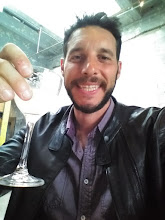The city is white with a recent snowfall. There’s not a lot of the stuff, just enough to lend the streets, sidewalks and buildings the gleam of freshly polished porcelain. The occasional whip of wind rouses a powdery mist off parked cars. It’s enough to keep all but a few buttoned up figures indoors. Inside the garage’s office cum waiting room, the driver can hear the faint whistle of winter gaining strength as it blows along open but empty storefronts and rattles windows. He’s glad to be there, slunk in a ratty green chair and warmed by an electric heater. It’s only when the wind climaxes at a squealing pitch that he feels the shiver deep within his marrow.
The garage owner appears before him, looking stern in a business-like tie, shirt and suspenders. He flops a file down on his desk and gives a grimace of stubbornly tolerated discomfort. This reminds the driver of a Hollywood detective, pained by the persistence of a seemingly insolvable case. It never occurs to the driver how much his experiences are filtered through the lens of popular movie tropes: the hard-boiled detective, the irresistible –and blond coiffed- femme fatal, the drifter with a troubled past, and so on. That’s why it’s odd he never sees himself as filling any similarly clichéd role. Maybe the driver, like everybody else, likes to think of himself as unique, laying just this side of a summary definition. He shoots the owner a quizzical look stolen straight from the actor’s handbook: palms up and open, resting on each knee.
“Good news is we can save your radiator. Some of the grating charred, but we can fix that.” He straightens himself up, standing behind his desk chair. His hands go from the chair to his waistband. He gives it a routine tug.
“Bad news, is it’s gonna be bout three hours. I’ve only got one man on today, an he’s swamped as is. You can stick around a little, can’t ya?” His expression goes from stern to jolly with a quick flap of the jowls. The driver really can’t afford to waste the rest of the afternoon, especially when he’s gotten this close to Michigan. He sinks further into the chair and the scratchy cushions absorb the weight of his tired body as the waves of heat coming off the electric coil threaten to send him into a cataleptic sleep. It’s comforting, luxuriant even, and he’s so exhausted that he doesn’t care to go anywhere else. He decides to merely ask after the cost, with eyelids sinking fast.
“It’s gonna be thirty dollars, with parts, labor, an tax.” The owner delivers the news with a matter-of-fact tap of his suspenders, as if they are the abacus used to compute such estimates.
“Parts? You juss said th’radiator could be saved.” The driver knows he’s going to get bilked no matter what, but this is the most resistance he can muster while fading into a warm pool of unconsciousness.
“The radiator, yes. But we’re gonna have ta scrap all the hoses and valves that got singed. Ya know, you’re really lucky in a way….” So comes the con’s assurance that it could have been a lot worse, and how the driver’s lucky he’s only being swindled for thirty: a small price to pay if it will get him the rest of the seven miles. He agrees with a curt “fine, juss get it done,” before nodding out completely. The last thing he feels is the worn-thin cloth of the chair against his neck; and he’s gone.

